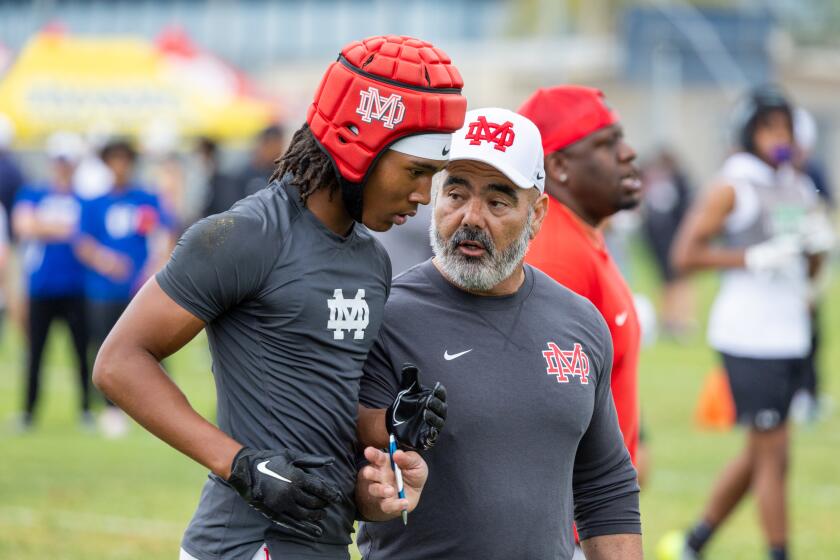Handing Off the City Section : Harkness’ League Realignment Won Praise; Recruiting, Eligibility Issues Drew Headlines
The disarray in which Hal Harkness found City Section athletics when he became commissioner in 1986 was evident just by the names of the leagues.
Young athletes competed in leagues named Crosstown, Metro and Freeway, a constant reminder that they often spent more time riding buses than playing games. It was not uncommon for a school such as Locke High to play a football game at San Pedro one week and at Wilson in East Los Angeles the next.
“It was a waste of time to play schools so far out of our area,” Locke football Coach E.C. Robinson said. “Kids would cut one or two classes to get to the locker room to change and catch a bus at 2 p.m. Then we would run into all that traffic coming back on a Friday night.”
It was that sort of scheduling nightmare that Harkness confronted when he took over as commissioner, replacing Jim Cheffers. In 1988, he initiated the realignment of the 49 Los Angeles Unified School District schools into two divisions with six geographically compatible conferences. It was one of his major accomplishments.
Harkness, who will turn 55 in September, announced his retirement as commissioner in June. He will be replaced by Barbara Fiege, Belmont High’s athletic director, on Oct. 11.
During his tenure, Harkness reorganized and created a more cost-effective and time-efficient sports program for the nation’s second-largest school district. He served as an executive secretary for the Interscholastic Athletics Committee, helping shape rules and create a more effective policy-making group.
“He was a no-nonsense type of guy with strong ethical standards, which he lived by and expected others to live by,” Banning Principal Augustine Herrera said. “He believes in doing things by the book. He had high standards for athletics and he expected people to follow those rules.”
Harkness also made the commissioner’s office more accessible and supportive of coaches and school administrators.
“I always thought Harkness was pretty fair and very professional,” Manual Arts basketball Coach Randolph Simpson said. “He always followed through with things when I needed help, and he was always respectful. It didn’t matter if you coached a team with the worst record, he treated you like you were a state champion.”
But Harkness also had detractors.
Controversies over recruiting and eligibility requirements have generated headlines during his tenure, and his relationship with school district officials was almost nonexistent--a situation that has tinged his departure with some bitterness.
As commissioner, Harkness said he never had an official meeting with the district superintendent or stood before the school board. Major decisions by school district officials regarding the athletics program were made without his input, he complained.
“I think my biggest challenge was the district’s lack of understanding of the athletic programs,” Harkness said. “I believe, after working day and night with the schools, I have expert advice and counseling to give as part of the decision-making process and that it is not being utilized. I was never asked or consulted by the school board or any superintendent that I’ve worked under.
“I’m a front man as far as I’m concerned. I knew that when I came in. But enough is enough. I’m no longer comfortable with that position.”
Dan Isaacs, the district’s assistant superintendent for school operations, said Harkness had the attention of school district officials.
“Hal Harkness had direct access to me and (director of senior high schools division) Richard Browning on a regular basis,” Isaacs said. “Information that needed to be shared with the office of the superintendent was appropriately shared. I would like to add that I felt Hal Harkness did an outstanding job working to support the athletic program and on behalf of students, coaches and appropriate administrative staff.”
On Sept. 2, 1986, Harkness was named director of athletics for the City Section of the California Interscholastic Federation. He succeeded Cheffers, who retired after 23 years with the City Section, including 14 as commissioner.
The City Section is one of 10 state sections governed by the CIF. The City Section is not only a governing body, but also part of the Los Angeles school district. Its athletic office not only governs member schools, but also provides financing. Coaches’ salaries and transportation costs are its biggest expenses. Although the Southern Section office contains more member schools, it is not tied to one school district and is not involved with financing individual athletic programs.
Harkness won the City cross-country title at North Hollywood in 1955 and finished fourth in the state in the mile in 1956 before attending Occidental College. He spent most of his teaching career in Los Angeles schools, including Wilson, South Gate, Carson, University and Franklin.
From 1972 to 1976, Harkness was an assistant track coach under Jim Bush at UCLA and also head coach of the Bruins’ cross-country team. He coached boys’ track and was an administrator at Franklin from 1982 to 1986 before he became commissioner.
During his tenure, Harkness had to deal with a 1989 teachers strike and a threatened walkout this year. His athletic budget was reduced from a high of $4 million in 1991 to $3.5 million in 1992. Three assistants and a secretary were eliminated from his staff and reassigned to other positions within the district.
Aside from those monetary concerns, Harkness’ daily agenda included smoothing out scheduling problems with year-round schools, overseeing transportation problems, fielding complaints about referees, mediating individual disputes between schools and monitoring athletic eligibility.
Several of those matters drew media attention over the course of Harkness’ career as commissioner. Among them:
* In 1986, Franklin was stripped of its 3-A football championship because one of its players was discovered to have received an unauthorized grade change. Harkness knew the teachers involved, but still made the decision against his former colleagues.
“I thought it took a lot of courage because he had worked at Franklin for all those years,” Jefferson Coach Hank Johnson said. “I thought he would continue along those same lines, but I think he could have made more tough and proper decisions regarding athletics.”
* In 1988, Harkness initiated a sweeping realignment of leagues for all 49 City schools. The proposal reduced travel time and expenses and kept schools in the same leagues for most sports.
* The 1989 teacher’s strike threatened the City 4-A and 3-A baseball playoffs. Harkness developed a contingency plan before the strike was settled that saved the 16-team playoff tournament, which was completed in five school days.
* Later, in the spring of 1989, all-City quarterback Perry Klein was permitted to transfer from Palisades to football powerhouse Carson. After Klein helped the Colts win the City 4-A title, he transferred to Santa Monica, his third school in less than a year. It was an embarrassing situation for Harkness, who admitted that he did not sufficiently monitor Klein’s residency.
* In 1990, a City 4-A Division Dorsey-Banning semifinal game ended with 15 seconds left in the fourth quarter when a group of Dorsey players and supporters had a heated verbal exchange and several scuffles with Banning supporters. The Dons were upset about the officiating and lost, 21-20. Bitterness between the two schools remains as Dorsey has grown as a football powerhouse.
In 1991, Banning, which cited gang-related problems near Dorsey, forfeited a game rather than play at Jackie Robinson Stadium. The teams met later that year in the City championship with Dorsey winning the title, 33-30. Last season, the teams agreed to play at a neutral site, El Camino College.
“I had a great sense of frustration, trying to solve the problems between Banning and Dorsey,” Harkness said. “Our office spent a month trying to mediate the situation, but we weren’t able to do it.”
The most controversial story appeared this year, when a Los Angeles Times investigation questioned whether Crenshaw used four ineligible players to win its City and State basketball titles. Harkness completed his own investigation and found Crenshaw innocent of any wrongdoing.
Fiege, who worked on the Interscholastic Athletics Committee panel which investigated the case, supported Harkness’ decision.
“As far as the Crenshaw case is concerned, the IAC must have facts and not allegations. The L.A. Times brought allegations before the rules committee which were found insufficient.”
About recruiting allegations, Harkness said: “People say we’re unresponsive and don’t care about recruiting, (that) nothing is done about it. Well, that’s as far from the truth as you can get. We can’t deal with accusations and innuendoes. We need hard evidence and that has been lacking.”
Although he is retiring from the school district, Harkness will continue to work with the State CIF office. He will coordinate state tournaments for cross-country, girls’ volleyball, wrestling, boys’ and girls’ basketball, and track and field.
Get our high school sports newsletter
Prep Rally is devoted to the SoCal high school sports experience, bringing you scores, stories and a behind-the-scenes look at what makes prep sports so popular.
You may occasionally receive promotional content from the Los Angeles Times.



